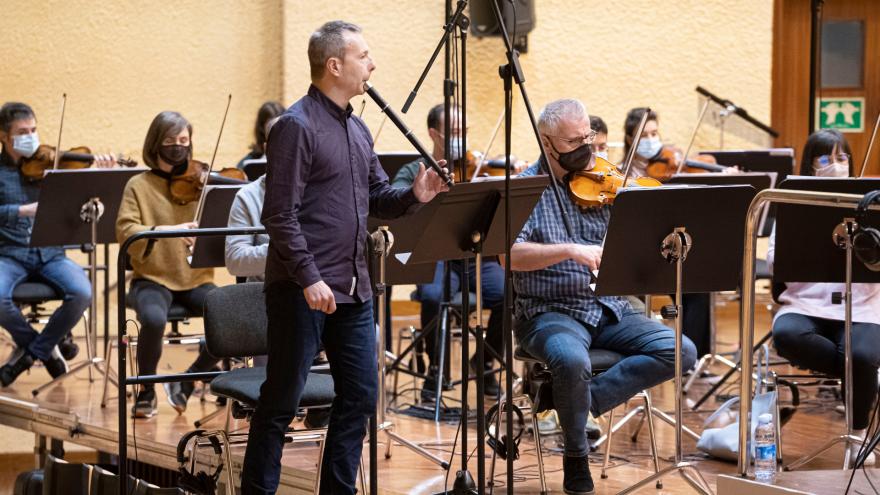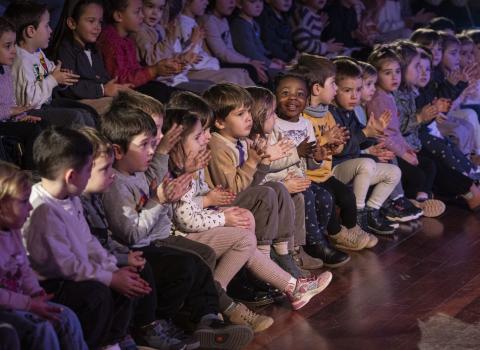Garikoitz Mendizabal and the Basque National Orchestra come together for 'Gutizia'

The txistulari (txistu player) Garikoitz Mendizabal and the Basque National Orchestra join forces to record eight works for txistu and orchestra composed by authors of diverse origins. Through their alliance, they hope to broaden the repertoire for this instrument and boost its international audience.
Two worlds which, on the face of it, are completely unrelated, have come together to produce Gutizia – a smorgasbord that directly links the txistu, an instrument deeply rooted in Basque culture, with a symphony orchestra. This is what's currently occupying Garikoitz Mendizabal and the Basque National Orchestra in Miramon, as they prepare to record and promote a compendium of works for txistu and orchestra. In the words of Garikoitz Mendizabal, one of the proponents of this instrument, the goal is to ‘broaden its repertoire, so that the txistu can naturally step onto the international stage with orchestras across the world’.
The record will comprise a total of eight works written or arranged by authors of diverse origins, rendering this collection of music a journey in itself. Most of the works will have their premiere on this record, and each has its own story and motivations behind it: a tribute to Kenya (Karibu Peponi); an expression of the emotions that human beings experience throughout our lives (Legend); a showcase of the txistu as an instrument that holds its own with an orchestra (Symphony-Concerto); or the piece by Lebanese composer Naji Hakim, who took inspiration from Basque melodies and introduced the txistu as a solo instrument in a classical concerto with three movements (Concerto for txistu and orchestra).
Project participants
Jaume Santonja, Associate Conductor with the Basque National Orchestra, will act as Musical Director for Gutizia. Garikoitz Mendizabal, the orchestra and the composers will be joined by the soprano Naroa Intxausti, the children’s choir of the Francisco Escudero Conservatory directed by Eva Ugalde, and Iñaki Tellería and Marc Blanes for production and sound.
The international label Orpheus Classical will record this musical project. It will be available on CD and on Spotify and iTunes, with release scheduled for after summer.
Garikoitz Mendizabal (Zestoa, 1973) is an icon when it comes to performing on the txistu and to promoting and showcasing this instrument. He has undertaken an incredible labour over recent years with contemporary composers to create new repertoires. Gutizia is the fruit of this labour. As he herself says, ‘You can’t deny that with new music comes a broader and enriched repertoire for txistu and orchestra. This has always been my goal throughout all these years: to leave a legacy for generations to come. Not just Basque musicians but foreign composers who have written for an instrument that is so inherently Basque. I'd like the txistularis of the future to have more options and more material that they can play accompanied by a large orchestra. As is the case with other non-standard instruments (accordion, guitar, etc.), on the orchestral scene the txistu will naturally have more opportunities to play alongside a symphony orchestra, both in the Basque Country and abroad. I firmly believe that this instrument will be an invaluable resource to the international expansion of Basque culture. In fact, I’ve heard how excited listeners are when they hear our txistu accompanied by an orchestra. All I am doing is giving you my time, my enthusiasm and my excitement’.
For the Basque National Orchestra, this coupling of two worlds is a continuation of its calling to promote and disseminate Basque culture, on this occasion via an instrument with deep local roots and a strong tradition behind it. Previous examples of this phenomenon involved the txalaparta (Oreka TX / Kalakan), the bagpipes (Gaiteros de Elciego) and the trikitixa (Kepa Junkera). As has always been the case in this series of projects, the goal is to give the instrument a new lease of life and to create a formal record of the richness of Basque cultural heritage.
Information sheet
Pieces in order of recording:
- Legend......................................................... Eduardo Moreno [17 min]
- Concerto for txistu and orchestra................. Naji Hakim [12 min]
- Hora stacatto................................................ Grigoras Dinicus (Arranged by: Iñaki Urkizu) [2 min]
- Iruten ari nuzu.............................................. Popular (Arranged by: Kepa de Miguel) [4 min]
- Atzo ttun ttun................................................ Popular (Arranged by: Kepa de Miguel) [4 min]
- Karibu Peponi.............................................. Javier Martinez Campos [10 min]
- Symphony-Concerto.................................... David Johnstone [27 min]
- Fandango Zaharra....................................... Unknown composer (Arranged by: Pierre Wekstein) [4 min]
Participants:
- Garikoitz Mendizabal, txistulari.
- Basque National Orchestra.
- Naroa Intxausti, soprano.
- Children’s choir of the Francisco Escudero Conservatory. Director: Eva Ugalde.
- Jaume Santonja, orchestral conductor.
- Iñaki Telleria and Marc Blanes, production and sound.
Notes on some of the pieces comprising Gutizia
Legend (Eduardo Moreno)
This score is undoubtedly an attempt to express the emotions that human beings experience throughout our lives. The voice that transmits them is none other than a small being like any one of us, or better said, a humble instrument: the txistu.
We steal its language and its form of expression, we rob it of its personality by taking it out of its context, and we give it the opportunity to show us the emotions that everyone feels: joy, love, pain, the fight, and of course, desperation.
Legend tells a story, but it also strips the txistu of all the artifice created by tradition, leaving it free to express, through its sound, the deepest experiences humans have gone through for centuries.
Concerto for txistu and orchestra (Naji Hakim)
A concerto with a classical three-movement format. Lebanese composer Naji Hakim took inspiration from Basque genres and melodies. The first movement comprises a mazurka and a danceable minuet, while the second alludes to the funeral march titled Gernika, by Pablo Sorozábal. The third and final movement is about dance.
Hora Staccato (Grigoras Dinicus, arranged by Iñaki Urkizu)
A much-loved virtuoso piece, now presented for the first time for txistu and orchestra.
Iruten ari nuzu / Atzo Ttun ttun (Popular, arranged by Kepa de Miguel)
Well-known Basque songs by an unknown composer, now arranged by Kepa de Miguel Garbizu. For Garikoitz Mendizabal, this return to his student days in the conservatory 25 years ago evokes nostalgia and memories. Hence, he entrusted his beloved professor with the orchestration. Amaia Zipitria (his piano accompaniment) and the soprano Naroa Intxausti will perform in a piece that Mendizabal sees as ‘an emotional end to a cycle’.
Karibu Peponi (Javier Martínez Campos)
Karibu Peponi was composed in 2021 for solo txistu and symphony orchestra. The piece was commissioned by Garikoitz Mendizabal and is dedicated to him on account of the friendship and diverse professional experiences and collaborations that bond the composer and the txistulari together.
The piece is a small tribute to Kenya, its people and its flora and fauna. Hence the Swahili title ‘Karibu Peponi’, which translates as ‘Welcome to paradise’. When Martínez Campos was there in 2019, he met a warrior from the Samburu people who would improvise on a three-holed flute. The instrument inevitably reminded him of the txistu, and it seemed appropriate that it play the leading role in this tribute.
The work uses the African Makru rhythm and is structured around two themes which are developed via rhythmic, harmonic and melodic variations and a constant dialogue between the soloist and the orchestra. The result is a technically demanding and expressive composition for the soloist, in terms of the score itself and the pace, as well as the phrasing and musicality. For the orchestra, the piece is colourful, evocative and grandiose.
Symphony – Concerto (David Johnstone)
The composer’s primary aim was to create an important addition to the txistu soloist’s repertoire, in terms of both the difficulty of the piece and the symphonic structure. In this piece, the soloist is the equal of the orchestra in a musical creation that presents a symphonic transformation and an organic structure. Hence the title. The work is undeniably spiritual, but by no means decidedly religious, at least not in a traditional sense.
The first movement opens with a prayer, reminiscent of a romantic film, with a solo part that at times you could sing along to and at others is oratorical. However, the orchestra accompaniment gradually increases the tension that turns the solo part, desperate and crestfallen, on its head.
In the second movement, the orchestra abandons the soloist completely, the latter having to find their own way in the form of a long cadenza. Johnstone relentlessly launches into the third fast movement. Titled ‘Freedom’, the string part in this allegro is fairly aggressive. Later, the soloist largely dominates the development section. There are fast-paced moments, a huge mix of tension and rest, a subtle but energetic cadenza by the soloist and the string soloists, and a glorious and triumphant coda, to bring the work to an exhilarating and brilliant close.
The work is dedicated to Félix Palomero ‘for believing in me’, to quote the composer.
More information
Picture from the recording (.jpg)Concerts & Tickets February














